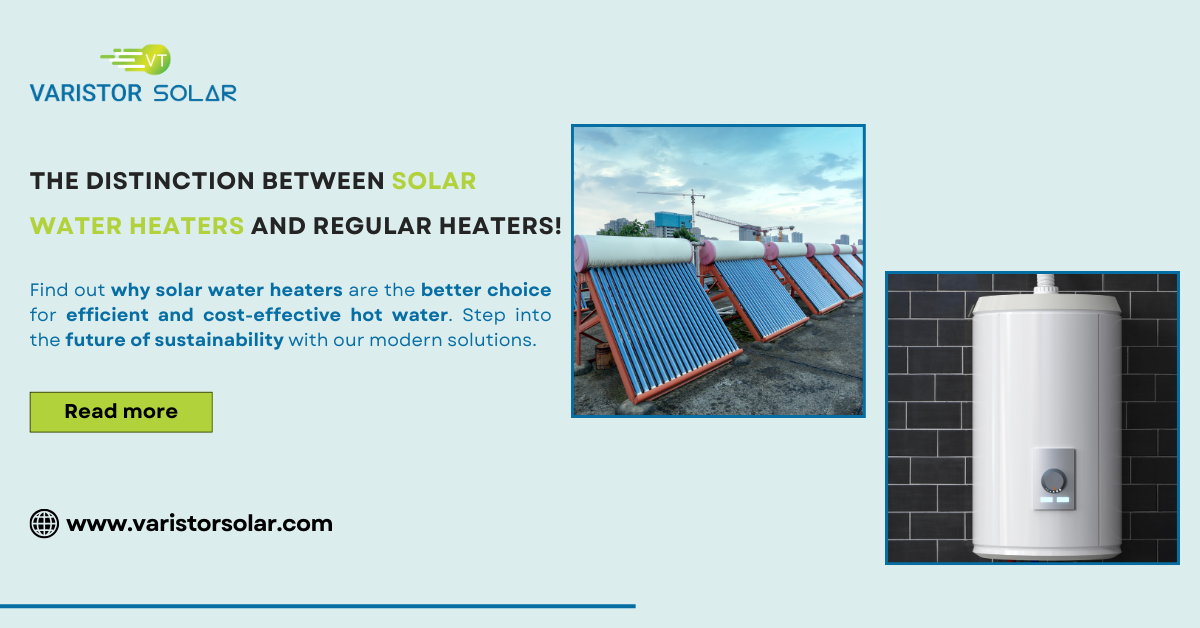
Varistor Solar is dedicated to empowering individuals, businesses, and communities with the transformative power of solar energy. We believe in a brighter, cleaner future and are committed to making sustainable living accessible to everyone.
+91-9113690456
Email: sales@varistorsolar.com
Varistor Solar
NO 40/C, KALKERE VILLAGE,12TH MAIN, NRI LAYOUT,Ramamurthy Nagar, Bangalore North,Bangalore- Karnataka, 560016
Water heaters are essential for modern living, ensuring a steady supply of hot water for daily activities. Whether conventional or eco-friendly solar, they enhance comfort and hygiene. In colder regions, they prevent discomfort, while in warmer areas, they maintain hygiene standards. This blog explores the differences between regular and solar water heaters, considering sustainability goals and climate variations.

Solar Water Heaters
Working of Solar Water Heaters
Solar water heaters utilize sunlight to generate heat for water heating. Typically, they consist of solar collectors, absorbing sunlight and converting it into thermal energy. A fluid circulates through these collectors, carrying the heat to a storage tank. Within the tank, a heat exchanger transfers the thermal energy to the water, ensuring a constant supply of hot water.
This sustainable technology reduces reliance on conventional energy sources, contributing to environmental conservation. Operating on the principle of harnessing solar power, these heaters are both efficient and eco-friendly, offering an innovative solution for homes and businesses seeking a renewable and cost-effective approach to water heating.
Benefits of using solar water heaters, such as energy efficiency and cost savings
Solar water heaters offer significant benefits, excelling in energy efficiency and cost savings. By harnessing sunlight, they reduce reliance on conventional power sources, minimizing utility bills. Eco-friendly and sustainable, they contribute to a greener environment. Investing in solar water heaters not only conserves energy but also leads to substantial long-term financial advantages.
Potential drawbacks of solar water heaters, such as upfront costs and reliance on sunlight
While solar water heaters offer eco-friendly benefits, potential drawbacks include upfront costs for installation. Additionally, their efficiency relies on sunlight availability, which may be inconsistent. Despite these considerations, the long-term savings and environmental advantages often outweigh these challenges, making solar water heaters a viable and sustainable choice for many.
Regular Water Heaters
Conventional heaters, powered by electricity or gas, are essential for maintaining warmth in homes and workplaces. They provide consistent heat, ensuring comfort in varying climates. While effective, they often contribute to higher utility bills and carbon emissions. Regular maintenance is crucial for optimal performance. Advances in technology have introduced more energy-efficient models, promoting sustainability. Despite innovations, traditional heaters remain a staple for many, offering reliable heating solutions. Balancing their effectiveness with the growing emphasis on eco-friendly alternatives is key for individuals seeking comfort while minimizing environmental impact.
Overview of traditional water heaters, such as electric or gas-powered models
Electric Water Heaters:
Electric water heaters are a common choice, utilizing heating elements to warm water. They are reliable but can contribute to higher utility bills. Regular maintenance is vital for optimal performance and safety.
Gas-Powered Water Heaters:
Gas-powered water heaters rely on a burner and combustion process for heating. While effective, they also have an impact on utility costs. Like electric heaters, regular maintenance is essential to ensure efficiency and safety in operation.
Understanding the characteristics of both types helps individuals make informed choices based on their specific needs and preferences.
Comparison of energy consumption between regular heaters and solar water heaters
| Aspect | Regular Heaters | Solar Water Heater |
| Energy Source | Electricity or Gas | Sunlight (Natural Resource) |
| Initial Cost | Varies (Lower upfront) | Moderate to High |
| Operating Cost | Moderate to High | Low to None |
| Environmental Impact | Carbon Emissions | Eco-friendly |
| Reliability | Consistent Performance | Dependent on Sunlight |
| Long-Term Savings | Limited | Significant |
| Maintenance Requirements | Regular | Periodic Check-up |
| Independence from Grid Power | No | Yes (to some extent) |
Conclusion
Elevate your hot water experience with Varistor Solar, the go-to choice for cutting-edge solar water heaters! Our state-of-the-art technology ensures unparalleled efficiency and reliability, all while making a positive impact on the environment. Say goodbye to high electricity bills and embrace significant cost savings with our eco-friendly solar solutions. Varistor Solar's commitment to top-notch quality guarantees durability, making it a smart investment for your home or business.
When it comes to choosing between conventional water heaters and Varistor Solar's innovative solar water heaters, the decision is clear. Opt for sustainability without compromising performance – Varistor Solar stands as the epitome of excellence in the realm of solar water heating. Make the switch today and bask in the advantages of a greener future with Varistor Solar – where the power of the sun meets cutting-edge technology!
FREQUENTLY ASKED QUESTIONS
Solar water heaters harness sunlight, offering higher energy efficiency.
Solar heaters reduce carbon footprint, contributing to eco-friendliness.
Solar heaters adapt well to diverse climates, ensuring reliable performance.
Solar heaters may have higher upfront costs but generally require less maintenance.
Consider upfront costs, sunlight availability, and long-term savings for an informed decision.
Now It's Your Turn:
Making the switch to solar water heaters is a smart and sustainable choice. The top brands like Varistor Solar™, Racold, Havells, V-Guard, and AO Smith offer reliable options to meet your hot water needs efficiently.
Among these, Varistor Solar™ stands out as the top choice in India, trusted by many. We provide a variety of solar water heaters, catering to different preferences and requirements. Our clients trust us for our quality and performance.
For more details about our solar water heaters, call us at 9113690456 or email sales@varistorsolar.com. Choose Varistor Solar™ for a greener and more energy-efficient future.
"WHAT YOU CAN READ NEXT"
 Read more +03 September 2024 in Solar Water Heater
Read more +03 September 2024 in Solar Water HeaterWhich is the Best Solar Heater Brand in Yeshwanthpura, Bengaluru
 Read more +03 September 2024 in Solar Water Heater
Read more +03 September 2024 in Solar Water HeaterWhich is the Best Solar Heater Brand in Yelchenahalli, Bengaluru
 Read more +03 September 2024 in Solar Water Heater
Read more +03 September 2024 in Solar Water Heater




